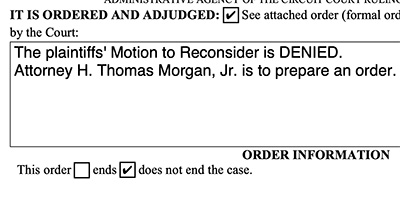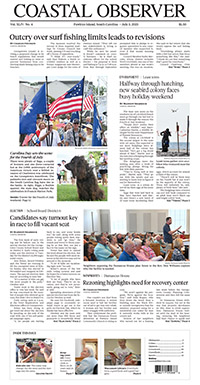Land use
Judge’s dismissal of townhouse suit echoes ruling from 1996

Judge Ben Culbertson rejected a claim that Georgetown County’s land use plan took precedence over the zoning ordinance and development regulations.
The plan “merely provides a general direction for Georgetown County Council and the [Planning Commission] for considering future rezoning. It does not constitute a mandatory requirement that must be strictly adhered to,” he wrote.
That was in 1996, when Culbertson was the county’s master in equity.
Last week, as a Circuit Court judge, he denied a request to reconsider his decision to dismiss a lawsuit seeking to overturn the county’s approval of two townhouse developments in the Pawleys Island area that also centers around the role of the comprehensive plan.
Culbertson was the third judge this year to dismiss a lawsuit filed by Keep It Green Advocacy on behalf of neighbors and citizens groups seeking to overturn county approval of townhouse developments. All three have now declined to reconsider their decisions.
Lawyers for Keep It Green Advocacy appealed two cases to the state Court of Appeals and said they plan to appeal this one too. A fourth suit, filed in January 2022 seeking to overturn the rezoning of property south of Pawleys Island to allow smaller lots is before the Court of Appeals because the property owner asked the court to reverse the decision of the lower court in denying his counterclaims against the plaintiffs.
After the Appeals Court rules, the county will ask the Circuit Court to dismiss that suit as well, said Tommy Morgan, the assistant county attorney, who is handling all four cases.
“These are not legal issues that are before the court. These are political issues,” he said.
The lawyers for Keep It Green Advocacy have argued that the courts were premature in dismissing the cases without hearing evidence.
“This is extremely early in the case, and in all three instances the courts have found there is no legal basis for their complaint,” Morgan said.
Culbertson asked Morgan to write a proposed order denying the plaintiffs’ motion to reconsider his earlier ruling. Morgan argued in a hearing last week that the motion didn’t meet the standard for review because it failed to show the judge did not consider all the elements of the complaint or had misunderstood them.
A key argument in each suit involves the role of the comprehensive plan, particularly its land use element, one of 10 elements that local governments are required by state law to include and update at least every 10 years. Georgetown County is currently updating its land use element, which was last updated in 2007.
The 1997 plan was the first adopted under the current state law, which was passed in 1994 and which gave localities until 1999 to comply.
In June 1995, before that process got underway, the county approved a subdivision of 6.4 acres in the True Blue neighborhood that allowed 23 dwellings on 13 lots. The neighbors, who had successfully asked the county to rezone their property from a “general commercial” district to districts that reduced the density, filed suit. They argued that the comprehensive plan showed the area as “low density single-family residential.”
The plaintiffs asked the court to declare that the county’s approval violated state law and its own comprehensive plan.
The case was referred by the Circuit Court to the master-in-equity, Culbertson.
In ruling for the county, Culbertson noted that the “plaintiffs’ central argument in this case is that the density recommendations contained in the 1985 Land Use Update are mandatory and binding on the Georgetown County Council and the [Planning Commission] for all subsequent zoning amendments and subdivision approvals.”
Since the unelected commission was charged with making the recommendations in the land use plan, to do so would give its decisions greater authority than those of the elected council, Culbertson said in his ruling.
“This process is clearly not in accordance with the statutory scheme of land use planning and control,” he said.
The ruling was not appealed. The townhouses in the approved subdivision were never built.
In arguing last week that Culbertson should change his ruling dismissing the townhouse suit, Patrick Hubbard, a USC law professor and member of the Keep It Green Advocacy legal team, said even he wasn’t sure what the state law means when it says zoning must be made “in accordance with the comprehensive plan.”
That’s why the suit needs to move forward, he said.
“I would disagree with the good professor,” Morgan said.
The True Blue suit from 1995 shows “this has been settled for 30 years,” he said. “The comprehensive plan is just that; it’s a guide.”
The reasoning behind Culbertson’s decision in that suit, even though some of the particulars have changed, remains valid, he added.
“If the planning commission is the ultimate authority, voters have no say,” Morgan said. “The planning commission gets to have a say, but not the last word.”
Cindy Person, executive director of Keep It Green Advocacy, said they plan to appeal Culbertson’s decision as soon as the written order is filed.




